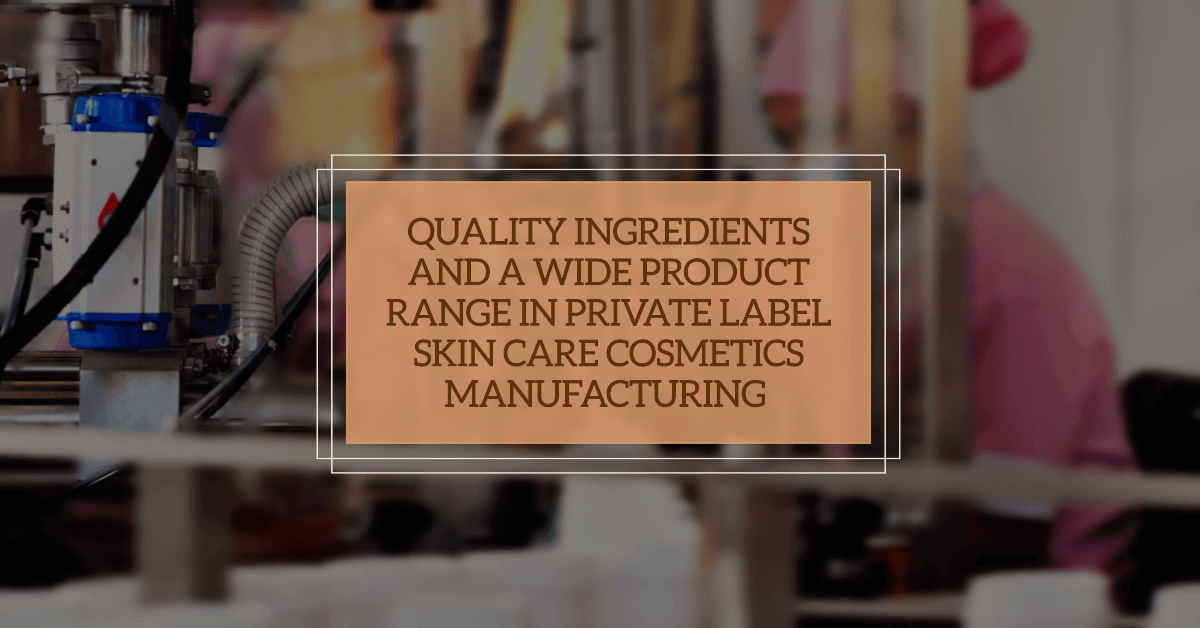The beauty industry is evolving every day. Each year, popular actresses, bloggers, and singers release their line of cosmetics, each product of which is unique and aimed at addressing various consumer needs.
Drawing from the experience of public figures, many entrepreneurs want to try their hand at a new direction. It may seem quite simple, and from the desire for implementation, only a few steps are needed. However, the industry has many nuances that should be studied before starting work on creating your products. The effectiveness of a business project for private label skin care cosmetics manufacturing will depend largely on the idea, implementation, and accuracy of calculations.
Effectiveness of private label skin care cosmetics
Advantages of skin care cosmetics manufacturing include:
- Involvement: Creating your brand of cosmetics allows you to delve into the specifics of each process, control the procurement of raw materials, adhere to quality standards, and choose packaging.
- Flexibility: Your brand enables quick responses to market changes and the introduction of innovations. You can experiment with formulas, creating innovative products.
- Long-term cost reduction: Initial investments will be high, but in the long run, you can save finances.
- Choice of industry professionals: You can personally select specialists to work on creating unique compositions, conduct testing, and approve the release of products to the market.
You can build your brand of cosmetics manufacturing even with just one product. Having an idea for at least one product and an understanding of consumer desires, you can start building your business.
Choosing quality raw materials
Cosmetic products consist of a set of raw materials that undergo processing to create the finished product. The set of components will vary depending on the product, but the types of raw materials are generally the same for the entire industry. Active ingredients, materials affecting product use, and aesthetic additives are found in every cosmetic jar. Stabilizers, diluents, and regulating agents simplify production and increase the market value of the product.
The first type of raw material for cosmetic production is the active substance. These are components that give the product effectiveness, making it work and fulfilling its functional purpose. Typically, these raw materials are found in cleansers, creams, and conditioners. Acids, antioxidants, dyes, and exfoliating agents are included in this category.
The second important component is aesthetic additives. Their main goal is to make the product more presentable. They should improve the product’s smell and feel. Thickeners, dyes, and fragrances are used for this purpose. There are components, such as jojoba oil, that can influence both the effectiveness and the appearance of cosmetics.
The third type of raw material should influence why the consumer should buy the product. For example, surfactants, often added to foaming cleansers to create a thick lather, and glycerin, which helps provide a smooth and physically appealing texture.
It is important to choose only quality raw materials that will give the product the desired effectiveness without causing any negative reactions. The consumer should understand that they are paying for a product that will satisfy their needs.
When creating private label skin care cosmetics manufacturing, you can use several production options. A more economical option involves using the raw materials offered by the factory. The advantage of this method is the absence of additional investments in raw materials, although it is necessary to purchase additional fragrances to make the product more pleasant for the buyer. If you wish to create cosmetic products from scratch based on your vision, you will have to purchase all the raw materials from scratch, which will temporarily freeze the invested funds.
Manufacturing Process
The entire range of cosmetic products goes through several stages. Initially, this is the inception of the product, which includes the idea, selection of product types, marketing research, and the choice of production type: mass, individual, or serial.
The next stage involves preparation for production: preliminary information gathering, selection of raw material suppliers, ordering the necessary packaging, making samples, and their approval. Subsequently, the required materials, components, and raw materials are ordered based on an approved sample. Upon receiving all the necessary components, specialists proceed to the manufacturing stage.
The final stage consists of preparing all the necessary technical and technological documentation. The product can only be implemented after all checks have been conducted, and certificates confirming the quality of the products have been issued.
The technological processes for each product are individual. For example, reactors are used for creams, where the product is brewed. The equipment used helps to carry out all the necessary technological and physical processes: dissolution, dispersion, homogenization, and obtaining a suspension or emulsion composition. Water is added to the reactor first, then heated, and raw materials are gradually introduced in stages. Additionally, a fat-melting boiler is needed for the preliminary separation before emulsification of the fat phase. Afterward, the water and fat phases are pumped, and homogenization of the composition takes place.
Product Range Expansion
In the creation of cosmetics, there are many nuances to consider in advance to choose the most effective brand development strategy. Changes in the market occur quite rapidly, requiring quick reactions and the implementation of innovations. While one can enter the beauty industry at the initial stages with one high-quality and effective product, expansion of the product range is necessary for the future.
Creating new products is a relatively lengthy process, prompting the need for advance planning. It is essential to constantly monitor market innovations, analyze competitors’ activities to stay in trend, and release products anticipated by consumers.
Deciding to expand the product range, attention should be paid to:
- Launching a product line: Creating a complete range of products that can work together to guarantee the best performance.
- Market trends: The beauty industry is rapidly evolving, offering new and more unique products. Orientation toward market trends will help create products that consumers want.
Based on these principles, expanding the product range will occur according to market demands, thereby meeting customer needs.
Marketing and Distribution Strategies
In promoting one’s own brand’s facial cosmetic products, it is necessary to know the answers to such questions:
- What is the uniqueness of the product?
- Why was such packaging chosen?
- Why should the consumer choose this product over the familiar ones?
- Which effect or component of the product can advertise it best?
A successful marketing strategy for a cosmetic brand depends on understanding market trends and understanding the target audience.
Marketers recommend combining traditional advertising with online promotion. However, with a limited budget, emphasis should be placed on online promotion. For this, the following tools can be used:
- Specialized groups and forums
- Social media
- Brand website
- YouTube channels with relevant themes
- Opinion leaders and bloggers
Before starting the promotion, online resources should be packed with maximum information and aesthetic product photos. Special attention is recommended for the brand’s story.
It is necessary to maintain communication with customers through answering questions, posting reviews, and attracting attention through contests, and activities.
Convincing a customer to buy a product can happen when there is an understanding of all stages of brand creation and awareness of its uniqueness.
Conclusion
Skin care cosmetics manufacturing should be based on three pillars: clear planning, investments, and a well-chosen marketing strategy. The success of implementing a business idea will come with careful planning and the ability to analyze one’s mistakes.
In the beauty industry, it is important to earn consumer trust by offering a quality product at a reasonable price. Customer loyalty is formed when they understand what they are paying for. Effective products will be successful with consumers, but it is crucial to continually seek new opportunities for implementing the marketing strategy.





